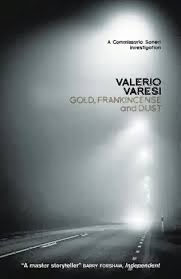Paul Whybrow
Full Member
I've just finished reading a crime novel called Gold, Frankincense and Dust, by a writer new to me, Valerio Varesi. It's the third story featuring Commissario Soneri, and I'll be seeking out the first two investigations, as it's an engrossing mystery.
The action takes place around Parma, in northern Italy, where the detective probes the mysterious murder of a Romanian immigrant, a beautiful woman loved by many powerful businessmen. Her burnt corpse is discovered beside a fogbound autostrada, after a multi-vehicle pile-up. The cover shows a foggy road:

 The entire investigation proceeds in mist and fog, with the Commissario as lost in his enquiries as he is in trying to find his way around the countryside with visibility down to a few metres. Further confused by a failing personal relationship, he sees spectres everywhere. The author creates a brooding atmosphere where nothing is quite what it seems.
The entire investigation proceeds in mist and fog, with the Commissario as lost in his enquiries as he is in trying to find his way around the countryside with visibility down to a few metres. Further confused by a failing personal relationship, he sees spectres everywhere. The author creates a brooding atmosphere where nothing is quite what it seems.
This year I've read several novels where the weather was as much a character in the story, as the location and the protagonists—ultimately determining their fate. The Tilted World, by Tom Franklin and Beth Ann Fennelly, made me feel soaked through, as it's set in endless rain of 1927 when the Mississippi River burst through the levee.
I felt frozen to my marrow reading Butcher's Crossing by John Williams (whose Stoner was recently rediscovered as a cherishable classic), as the hapless hero joins a doomed hunt for buffalo in a hidden valley, getting trapped in a blizzard.
The deservedly-praised The Dry by Jane Harper is a crime story set in sweltering drought conditions in the Australian Outback where the harshness of living there and the toughness of character it imbues are as merciless as the sun.
In my own writing, I've made sure that the weather has a role that influences what happens. One of my Cornish Detective investigations takes place in the wettest winter on record, in 2012. The downpour helps the serial killer elude his pursuers, destroying forensic evidence by literally washing it away. My detective finally resorts to a 19th-century solution of tracking down the killer, by enlisting the skills of a bloodhound, whose ability to detect smells, even in heavy rain, is mind-boggling.
Have you set any of your stories in adverse weather conditions?
How does the climate affect your characters' behaviour?
Do you have any favourite books where the weather dominates the action?
The action takes place around Parma, in northern Italy, where the detective probes the mysterious murder of a Romanian immigrant, a beautiful woman loved by many powerful businessmen. Her burnt corpse is discovered beside a fogbound autostrada, after a multi-vehicle pile-up. The cover shows a foggy road:


This year I've read several novels where the weather was as much a character in the story, as the location and the protagonists—ultimately determining their fate. The Tilted World, by Tom Franklin and Beth Ann Fennelly, made me feel soaked through, as it's set in endless rain of 1927 when the Mississippi River burst through the levee.
I felt frozen to my marrow reading Butcher's Crossing by John Williams (whose Stoner was recently rediscovered as a cherishable classic), as the hapless hero joins a doomed hunt for buffalo in a hidden valley, getting trapped in a blizzard.
The deservedly-praised The Dry by Jane Harper is a crime story set in sweltering drought conditions in the Australian Outback where the harshness of living there and the toughness of character it imbues are as merciless as the sun.
In my own writing, I've made sure that the weather has a role that influences what happens. One of my Cornish Detective investigations takes place in the wettest winter on record, in 2012. The downpour helps the serial killer elude his pursuers, destroying forensic evidence by literally washing it away. My detective finally resorts to a 19th-century solution of tracking down the killer, by enlisting the skills of a bloodhound, whose ability to detect smells, even in heavy rain, is mind-boggling.
Have you set any of your stories in adverse weather conditions?
How does the climate affect your characters' behaviour?
Do you have any favourite books where the weather dominates the action?
